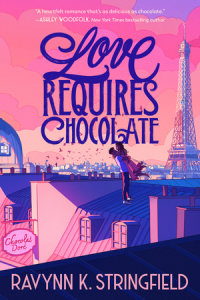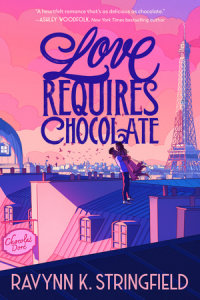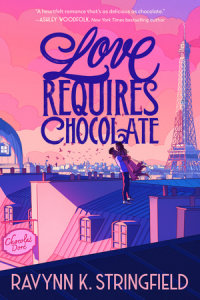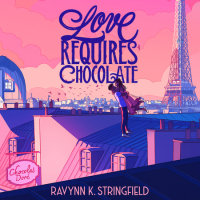Love Requires Chocolate
Love Requires Chocolate is a part of the Love in Translation collection.
A budding theater nerd has her semester abroad all planned out, until a cute soccer player offers to show her the real Paris—the first book of a YA romance series with international flavor!
“A heartfelt romance that’s as delicious as chocolate.”—New York Times bestselling author Ashley Woodfolk
Whitney Curry is primed to have an epic semester abroad. She’s created the perfect itinerary and many, many to-do lists after collecting every detail possible about Paris. Thus, she anticipates a grand adventure filled with vintage boutiques, her idol Josephine Baker’s old stomping grounds, and endless plays sure to inspire the ones she writes and—ahem—directs!
But all is not as she imagined when she’s dropped off at her prestigious new Parisian lycée. A fish out of water, Whitney struggles to juggle schoolwork, homesickness, and mastering the French language. Luckily, she lives for the drama. Literally.
Cue French tutor Thierry Magnon, a grumpy yet très handsome soccer star, who’s determined to show Whitney what she’s missing. Is this type-A theater nerd ready to see how lessons on the City of Lights can turn into lessons on love?
The swoony Love in Translation romances can be read together or separately:
LOVE REQUIRES CHOCOLATE • LOVE CRAVES CARDAMOM (Coming in May 2025!)
An Excerpt fromLove Requires Chocolate
SCENE ONE
Some People Don’t Appreciate the Value of a Good List!
“Mademoiselle!”
An out-of-breath man’s face crowds my phone screen as I slowly turn, capturing the bustling street outside Gare du Nord. The sound of the city is at a reasonable volume, so I can hear myself think. Though, admittedly, all the French landing on my ears is super jarring. I feel like a fish dropped into a huge new tank. Every voice jolts me, because even though I know the language, I can’t make my brain translate words fast enough to keep up yet.
The man’s face wobbles on the screen as my hand trembles with excitement. I’m here!
“Uh, hi!” I say, lowering my phone, then lifting my cat’s-eye sunglasses. “Or bonjour! You’re kind of in my shot.” I point to my phone with what I hope is a charming smile. The man’s cheeks are red from the heat, and his expression tells me he is uninterested in my shot.
“Are you Whitney Curry?” His thick accent nearly swallows my name.
“Yes! That’s me! The one and only!” I say, my stage smile turning into a real one. I finally notice that he’s holding a letter-sized piece of cardstock that has LYCEE INTERNATIONAL DES ARTS A PARIS (LIA)--WHITNEY CURRY printed across it. My name is bolded, and I’m impressed by the fancy school insignia embossed at the top. I wonder if he’ll let me have the sign for my memory book.
“I am Monsieur Guillaume Polignac, your ambassador from Lycee International des Arts, Paris, here to escort you to the dormitories.” He mops his brow with a handkerchief, and I immediately stick my hand out.
“Enchantee--” I start, but Monsieur Guillaume Polignac cuts me off.
“This way.” I try not to bristle at the fact that he ignored my attempt at French. My nose wrinkles at the rudeness anyway, but since he is my ride to my new home, I try to keep pace as I follow him up the sidewalk. When we stop at a tiny blue car, he struggles to lift my monogrammed trunk with the letters “W.C.” in spiraling white type on the front, and my brown leather valise, mumbling and probably cursing to himself in French.
“What do you have in here--a whole person?”
“Oh, just the essentials,” I tell him brightly. “Costumes, accessories, special lights. You know . . . everything a girl needs to thrive. There’s no such thing as being overprepared!”
Monsieur Guillaume Polignac raises his eyebrows at me before giving the trunk one last shove to pack it inside. “Such strange luggage.”
“It’s vintage. Very rare.” I climb into the passenger seat and buckle myself in, making sure to pull my braids out from under the seat belt. My heart is thudding against my rib cage, and I do my best to remain still. I want to do my “I’m excited” dance, but a quick glance at my stone-faced driver curbs the impulse.
Monsieur Polignac does not ask any questions, nor does music come on when he starts the car, which is just as well, as it would only interrupt my daydreaming. Before we’ve even started moving, my mind is buzzing. I am envisioning myself renting a car and driving out to Chateau des Milandes, the old estate where Josephine Baker spent much of her life with her children, on the weekends I have off from my rigorous Parisian art school schedule. I need to stand where she stood. I need to breathe the same air she did. I need to soak it all up so that one day I might be as iconic as she was.
I’m trying to manifest greatness, but my phone is vibrating in my pocket incessantly, making a grating noise against the car door. Texts flood in from my mom, asking a thousand questions about the flight and reminding me to turn on my location sharing. Another deep inhale and exhale before I dig my phone out and turn it on do not disturb.
Not right now, Mom. I’m drinking in Paris. I try not to think about my mom’s anxiety about me traveling alone for the first time and all the fights I had with her that led to this moment. I feel a little guilty that I do consider texting Nana instead, wanting to share this momentous occasion with at least one of them, but I ultimately decide that updating them both will have to wait. I sit back in the seat and think, I’m soaking up my new life far, far away from Mom’s fussing.
Monsieur Polignac inches through traffic down a picturesque street. You know, like the ones on postcards, with beautiful gardens enclosed by iron lace and cream-colored buildings that could double as elaborate cakes. We pass gorgeous glass storefronts spilling over with perfumes and scarves and purses. Beautiful people window-shop or clutch fresh flowers and baguettes. I even think I catch a glimpse of a chocolate shop. Bicyclists navigate the paths. It all feels like something out of a guidebook of Paris rather than the real thing. Excitement runs like lightning through my body, but I feel a small pit forming in my stomach. There’s so much to see. How will one semester be enough time?
“First visit to Paris?” Monsieur Polignac asks.
“Oh, oui,” I reply, slowly peeling myself away from the window. “I’ve wanted to come here my whole life. It’s my nana’s favorite city. She used to live here.” I rattle off Nana’s entire artistic career as a relatively well-known performer, singing and dancing throughout Europe and often in New York City in her twenties. But it’s not enough to just be the granddaughter of the incomparable Diana Curie. I’ve got to make a name for myself.
The legendary Whitney Curry.
Monsieur Polignac’s bushy eyebrows move up and down, and I know I’ve probably lost him at some point in my speech as we wind down another narrow street. But then his eyes have an unexpected mischievous sparkle, and he makes a turn.
“Well, it’s out of the way, but everyone should see it as soon as they arrive . . . ,” Monsieur Polignac mutters to himself. After several minutes in thick traffic, the buildings begin to fall away, and I can see the river, the Seine, with boats drifting down it, toting tourists taking photos. This is the river of songs and poems, the one that couples in romance movies walk along together. My heart is so full after these first few minutes in this city, and I’m suddenly sure I know what those lovers in all the classic Parisian-set stories feel.
On the street, people walk, bike, drive, and ride scooters around this busy area, making use of the many bridges to cross to the Left Bank. I have an urgent need to hear the chatter of the boulevards, to be out wandering the streets. I’m here to study, but I’m ready to be among them, getting to know the city as well as I know my audition materials. I consider leaving the window up so as to appear a little bit saner, but one only arrives in Paris for the first time once--and it’s imperative to do it right. I roll down the window and let the wind blow across my face as I take pictures with the Polaroid I stuck in my purse. The pit in my stomach starts to shrink, and I imagine it spiraling away like a ribbon in the wind. It’s replaced with a molten excitement that electrifies every vein in my body.
We arrive at a bridge with huge winged horses stationed on pedestals on either side, looking infinitely statelier than any of the numerous statues I’ve seen thus far. All of Paris looks elaborate, elegant, but these lions are positively ornate, and my eyes greedily drink them in.
“C’est le Pont Alexandre III,” Monsieur Polignac informs me as we join the line to make a turn to cross the bridge. I lean farther out the window, trying to snap a photo of the sculptures before they are no longer in view. Monsieur Polignac clears his throat. “You will want film for this. . . .” He points ahead and a little to the right.
My mouth drops open.
There, right in front of me, is the Eiffel Tower. Its base is partially obscured by trees and buildings, but the iron structure is unmistakable. It’s tall, towering above the landscape, sunlight glinting off it. Years of dreaming of this moment, and here I am, zipping across the Seine in a car on the most beautiful bridge in the world, looking at one of the most iconic monuments ever. And with the window down, all I hear is snatches of French--and maybe bits of other languages I can’t discern. Folks around the world want to be where I am right now. Before I know it, my throat is tight, and my eyes are itchy as they fill with tears.
I know Monsieur Polignac is looking at me with concern, but I can’t hold it in. Tears are streaming down my face, and I hiccup like a baby. I’m overwhelmed in the best way.
“Ca va aller, mademoiselle?” he asks, peeking at me from the corner of his eye.
“Oui, ca va,” I reply. “I just want to remember this moment.”
And even though the picture I’m about to capture will never tell the full story about how I feel in this moment, I lift my camera to my face to capture it anyway.
“The school is just ahead, near la Sorbonne. We are in le Quartier Latin. You will be but a short walk from the Seine,” Monsieur Polignac says after a while. We’ve passed the Eiffel Tower, where I got a few more pictures and cleaned my face with a handkerchief, courtesy of my guide, who continues weaving us through the city. I get the sense that he’s not taking the most efficient route, instead allowing me to see a few more sights, including the edge of the Luxembourg Gardens. We arrive in the fifth arrondissement, and I see lots of school campuses and cafes. Young people who I assume are students sit in front of the cafes, smoking and laughing with their friends, textbooks likely shoved into bags under the tables and forgotten.
There’s so much to see, and the prospect is thrilling, but I can already feel anxiety swelling in my chest as I think about navigating these streets on my own. When I first started driving, Mom always joked that I’d get lost going to school. She wasn’t wrong. . . .
But that’s a Tomorrow Whitney problem. Today Whitney is still experiencing her first Parisian car ride through intense Parisian traffic. The views are definitely worth focusing on.
I pluck my paper map from my bag and trace my short--but tastefully nude-colored--manicure over the different neighborhoods, which coil around each other like a snail shell. I colored in each one and annotated places I wanted to see. “Well, I can check ‘experience the Eiffel Tower for the first time’ off my list!” And after placing the annotated map on my knees, putting my journal on top of that, and steadying my hand, I do.
“Is that how you will be seeing Paris?” Monsieur Polignac chuckles. “By list?”
“Lists have never failed me. There’s nothing wrong with writing things down and checking them off. Gives me a happy feeling.” I wave my list gently in his direction.
“What do you have on there?”
I clear my throat and poke out my chest. I’ve been researching all summer. Whitney Curry’s Epic Parisian Bucket List has been vetted and obsessed over. Ironclad. Thrice approved, by three generations--Nana, Mom, and moi.
I start to read:
“First was see the Eiffel Tower. Then, have a luxurious picnic under it, with cheese and . . .” I cough to cover up the word wine.
He laughs.
“Second, visit all the museums, especially the Louvre, of course.”
“Bien sur,” he replies.
“Third, spend an entire month investigating all the churches. Notre-Dame, Sacre-Coeur, Sainte-Chapelle, et cetera . . .”
“Et cetera . . .” His eyebrow lifts. “Don’t forget that our beloved Notre-Dame is still under construction from the fire. It is not yet open to the public again.”
“Oh, right. I will just have to pay my respects from afar. I have every major church marked.” I point at the elaborate map, a supplement to the list currently spread out on my lap. “I have to see the Moulin Rouge and learn to make macarons and eclairs. But I’m still investigating the best pastry workshop to attend. Then I’ll need to stroll down the Champs-Elysees and stop at all of these shops.” I tap my route. “I need to experiment with perfume and make my own and get out to Versailles, and I have to visit a chocolatier . . .” My mouth can barely keep up with my list, causing me to nearly stumble over that last item. One of my greatest loves in life--after vintage dresses and midtwentieth-century theater--is chocolate. I almost don’t want to taste it here; it’ll probably ruin chocolate for me for the rest of my life.
“You’ve got a lot of things you want to do,” he says, giving me a look that’s somewhere between bemusement and amusement. Either way, I can tell he’s done hearing about my list even though I’m not halfway through.
I am nothing if not prepared to have the best semester of my life, starting with checking off everything on my Parisian bucket list. Most of it is for research purposes (that just happen to be lifelong dreams), which will inform the writing and execution of a fantastic one-woman senior thesis show, something my nana would be proud of.
He glances over at me before turning left down a dead-end street. The shrubbery falls away for a moment, and I can see a soccer field filled with boys about my age chasing a black-and-white ball. One boy sneakily cuts across the group and kicks the ball in the opposite direction, causing the rest to yell in protest. The boy’s focused face is disrupted by the barest grin, which causes me to smile.
Monsieur Polignac notices me watching and finishes his thought: “You will discover more if you wander. This is the type of city where magic can be found in the most unlikely places. People miss it when they run around the city with their guidebooks and websites.”
I nod and smile. Whatever.
He’s not a believer in the power of lists.
And he’s missing out.
I could never leave my study-abroad experience up to chance. Magic is made, not discovered.
He points. “Et voila!”
At the end of the cobblestone road is a massive building the color of cream, with bright shutters, iron balconies, and rose-colored window boxes spilling over with flowers. A gingerbread house. That’s the first thing that pops into my head. Something out of a fairy tale.




